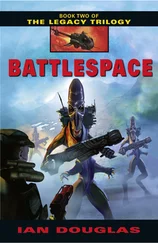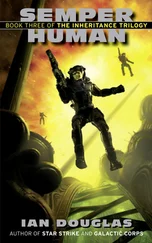Hunter had been thinking about Kelsey’s Star Trek analogy. The bad guys, it seemed, both human and alien, played for keeps.
There was more to it than simple self-preservation, too, or protecting Gerri. Kelsey hadn’t been able to say much, but what he had said opened up some startling doors.
Hunter had seen a spaceship. His debriefing interviews, the way they’d treated him, convinced him that there was not a nice, simple, and purely terrestrial answer to the puzzle. He couldn’t prove it, but he’d seen a real spaceship, aliens were here , and they meant business.
And now, Kelsey’s talk about Star Trek politics suggested that the aliens were not friendly, did not come in peace, that they were interfering in human activities in a big way, and they were ruthless in how they were going about their business. This was no bunch of interstellar tourists stopping by to point and look at the funny humans. They meant to take over.
An invasion …
“Well … I don’t care what you say,” she told him. “When you come back Stateside, you look me up, okay? We can pick up where we left off.”
He bit back his first answer, then gave a reluctant nod. “Okay. But when I look you up, I’ll expect to find you with a husband and six kids, okay?”
“Stripping and cocktailing with six kids? That’ll be the day!”
“Not a stripper, remember? An ecdysiast.”
“Bastard. When do you ship out?”
“Tomorrow afternoon.”
“Damn! So soon ? Who the hell did you fuck over to catch this shit?”
“Only you, I think.”
And then she cried.
CHAPTER FOUR Contents Cover Title Page ALIEN SECRETS SOLAR WARDEN, BOOK ONE Ian Douglas Copyright Dedication Prologue Chapter One Chapter Two Chapter Three Chapter Four Chapter Five Chapter Six Chapter Seven Chapter Eight Chapter Nine Chapter Ten Chapter Eleven Chapter Twelve Chapter Thirteen Chapter Fourteen Chapter Fifteen Chapter Sixteen Chapter Seventeen Chapter Eighteen Chapter Nineteen Chapter Twenty Chapter Twenty-One Chapter Twenty-Two Chapter Twenty-Three Chapter Twenty-Four Epilogue About the Author By Ian Douglas About the Publisher
We should think of the craft in the New Mexico desert as more of a time machine than a spacecraft.
DR. HERMANN J. OBERTH [ATTRIBUTED], 1974
SMOKE FILLED THEtiny cabin as the vibration increased. Die Glocke was reentering Earth’s atmosphere at high velocity, falling with the swollen, bottom end of The Bell facing in the direction of travel, which meant that General Kammler was being pressed back in his narrow seat by what felt like the weight of several people lying on top of him.
Ssarsk lay strapped into its rack just above him. “What’s happening?” Kammler yelled, trying to be heard above the thunder filling the cabin. “What’s wrong?”
Nothing wrong. The words formed silently in his head. Slowing to atmospheric velocity.
Kammler wished that there was a window in The Bell so that he could see out. Flying blind like this, locked into a claustrophobic tin can—it was a nightmare.
They’d left der Riese, the secret complex in the Silesian woods, only moments before. At first, there’d been no sensation of movement at all, no sense of acceleration, no noise or vibration. The Bell, though, Ssarsk had told him, was already above the atmosphere and preparing to land.
Then they’d plunged into the atmosphere, and into a nightmare of heat and smoke, of raw noise and unendurable vibration. Would they break up? Burn up? He didn’t know. He couldn’t trust the alien pilot to tell him what was actually going on. The Eidechse were emotionally remote and inscrutable. The name was German for “lizards,” and they did possess a cold, reptilian aspect that Kammler found disturbing.
Or, to be honest, quite frightening.
He tried to distract himself. Twenty years into the future! What would life be like, what would technology be like in that far-off age of 1965? Antigravity? Flying cars? The important thing was that people might have forgotten the excesses of the Third Reich. Not that wiping out the Jews was a bad thing, but the rest of the world simply didn’t understand.
Nullifiers inoperational , the pilot thought at him. Brace yourself.
Brace yourself? In God’s name, how?
The weight crushing him increased sharply, then fell away. It felt as though the craft had just changed its heading somewhat, slightly to the left. He wished he understood more about The Bell’s technology.
He wished he could see.
He tried to remember everything he could about The Bell. Ssarsk and several of its compatriots had been helping the Nazis for almost a decade. An alien craft had come down in a wooded Bavarian valley in 1936. Of the pilots—bulb-headed, skinny, just over a meter high, with enormous black eyes with no hint of white to them at all—only one had survived, but Ssarsk’s compatriots, a different species, had shown up soon thereafter. The Reich was already in the process of studying the wreckage, which was largely complete, hoping to back-engineer the craft.
The Eidechse had offered to help.
And all they’d asked in return was to become silent partners, as it were, in the world government the Reich planned to create.
The Eidechse had contributed incredible levels of knowledge to the Reich’s scientists. Von Braun’s rocket designs at Peenemünde, the disk-shaped craft being tested at Hauneberg, the new superbomb developed by Kurt Diebner—progress on all of them had been tremendously advanced by the Eidechse visitors. It was one of the brutal ironies of war that the Reich had collapsed mere months before the most powerful of those weapons could be deployed on the battlefield.
The machine referred to by the code name Die Glocke—“The Bell”—had started as an experiment in true antigravity, but the Eidechse had revealed a key fact of long-range space travel: traveling faster than light was also traveling in time . The Jew physicist Einstein had supposedly demonstrated that space and time were the same thing, that translation in one of four dimensions could be turned into translation in another. The Bell, it seemed, was proof of this, despite the fact that Reich science had been working for years to repudiate the theories of Jewish physics.
Ssarsk had piloted the prototype craft into space, made what it called a dimensional translation, and brought the craft back into Earth’s atmosphere.
The only question now was whether they could survive the landing.
That, and what year it would be when they landed.
Another course change , the pilot thought at him. Acceleration surged, and again there was a sharp sensation, this time to the right.
The vibration had largely faded away now, and Kammler could hear a rushing sound that he took to be the sound of wind whipping past the hull outside. Smoke continued to fill the compartment, however, and he realized that something must be burning inside the craft.
The Bell slowed almost to a stop, then made a broad, sweeping turn. We land. Brace yourself.
They hit something hard and the vibration returned, the noise a shrill thunder as if the craft was plowing backward through dirt. And then …
The stillness, the silence, were eerie. The craft’s internal illumination was gone, and they sat there in pitch-black darkness.
We arrive.
“Did we make it?” Kammler started coughing, and finally managed to add, “Did we go through time?”
Читать дальше












